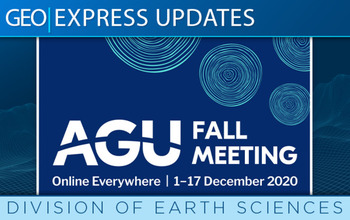NSF Earth Sciences Express Update - AGU 2020
November 23, 2020
The Division of Earth Sciences is looking forward to the upcoming virtual American Geophysical Union Fall meeting from December 1 - 17, 2020. We are highlighting sessions, posters, talks, town halls, and workshops featuring NSF Program Officers or that are relevant to EAR-funded interests including facilities, collaborative networks, education, broadening participation, and the effects of COVID-19 on the research community.
Please note that all times are AGU-specified meeting times (Pacific Standard Time) unless otherwise noted. Non-NSF staff are italicized.
December 2 (Wednesday)
GEO Virtual Office Hours: Navigating the NSF System
14:30 - 16:00 (Eastern Standard Time, non-AGU event)
Jennifer Wade, Michael Jackson, Henrietta Edmonds, Paul Cutler, Robin Reichlin, Anjuli Bamzai, and Kevin Johnson
December 7 (Monday)
T001. Advances in Understanding Continental Margin Evolution: Two Decades of GeoPRISMS and MARGINS Science III (Posters)
04:00-20:59
Jennifer Wade, Demian Saffer, Katherine Kelley, Harm Van Avendonk, and Anaïs Férot
ICDP & LacCore Town Hall Meeting
16:00 (Central European Time, non-AGU event)
Meeting ID: 832 7043 4770, Code: ICDP
TH037 - COMPRES: Future Directions for Materials Properties Research in Earth Sciences
10:30 - 11:30
Carl Agee and Andrew Campbell (COMPRES)
TH036 - EarthCube: A Community-Driven Cyberinfrastructure for the Geosciences—A Progress Report
10:30 - 11:30
Eva Zanzerkia and Michael Daniels
T006 - Advances in Understanding Continental Margin Evolution: Two Decades of GeoPRISMS and MARGINS Science I (Oral Session)
19:00-20:00
Jennifer Wade, Demian Saffer, Katherine Kelley, Harm Van Avendonk, and Anaïs Férot
T007 - Advances in Understanding Continental Margin Evolution: Two Decades of GeoPRISMS and MARGINS Science II (Oral Session)
20:30-21:30
Jennifer Wade, Demian Saffer, Katherine Kelley, Harm Van Avendonk, and Anaïs Férot
December 8 (Tuesday)
TH047 - A Vision for NSF Earth Sciences 2020-2030: Earth in Time Town Hall
10:30 - 11:30
James Yoder (NASEM)
December 9 (Wednesday)
ED015 - Expanding Opportunities in the Geosciences: Exploring Examples of Geo-STEM Learning Ecosystems That Promote Justice, Equity, Diversity, and Inclusion IV Posters
04:00-20:59
Cheryl Manning (Former Einstein Fellow) and Brandon Jones
ED016 - Expanding Opportunities in the Geosciences: Exploring Examples of Geo-STEM Learning Ecosystems That Promote Justice, Equity, Diversity, and Inclusion I
05:30 - 06:30
Cheryl Manning (Former Einstein Fellow) and Brandon Jones
ED017 - Expanding Opportunities in the Geosciences: Exploring Examples of Geo-STEM Learning Ecosystems That Promote Justice, Equity, Diversity, and Inclusion II
07:00 - 08:00
Cheryl Manning (Former Einstein Fellow) and Brandon Jones
ED018 - Expanding Opportunities in the Geosciences: Exploring Examples of Geo-STEM Learning Ecosystems That Promote Justice, Equity, Diversity, and Inclusion III
16:00 - 17:00
Cheryl Manning (Former Einstein Fellow) and Brandon Jones
December 11 (Friday)
U013-02 - Science Does Not Conduct Itself. So, Who's Conducting?
07:05 - 07:10
Brandon Jones
U013 - Centering Ethical Placed-Based Scientific Practices Through the Lenses of Communities of Color
10:00 - 11:30
Brandon Jones
December 14 (Monday)
SCIWS10 - Toward an International Critical Zone Network-of-Networks for the Next Generation Through Shared Science, Tools, Data, and Philosophy
07:00 - 13:00 (Note: registration for this workshop is now closed)
Bhavna Arora, James Stegen, Jannis Groh, Genevieve Ali, Pamela Sullivan, Basile Hector, Adam Wymore, and Andrew Ireson
December 15 (Tuesday)
ED043-0001 - Improving Undergraduate STEM Education: Pathways into the Earth, Ocean, Polar and Atmospheric & Geospace Sciences (IUSE:GEOPAths) – A National Science Foundation Initiative
04:00-20:59
Marissa Vara, Brandon Jones, and Lina Patino
December 17 (Thursday)
COVID-19 and Early Career Researchers: Challenges, Needs, and Support for Early Career Researchers
10:20 - 11:50
Aisha Morris (Panelist)
The U.S. National Science Foundation propels the nation forward by advancing fundamental research in all fields of science and engineering. NSF supports research and people by providing facilities, instruments and funding to support their ingenuity and sustain the U.S. as a global leader in research and innovation. With a fiscal year 2023 budget of $9.5 billion, NSF funds reach all 50 states through grants to nearly 2,000 colleges, universities and institutions. Each year, NSF receives more than 40,000 competitive proposals and makes about 11,000 new awards. Those awards include support for cooperative research with industry, Arctic and Antarctic research and operations, and U.S. participation in international scientific efforts.
Connect with us online
NSF website: nsf.gov
NSF News: nsf.gov/news
For News Media: nsf.gov/news/newsroom
Statistics: nsf.gov/statistics/
Awards database: nsf.gov/awardsearch/
Follow us on social
Twitter: twitter.com/NSF
Facebook: facebook.com/US.NSF
Instagram: instagram.com/nsfgov

